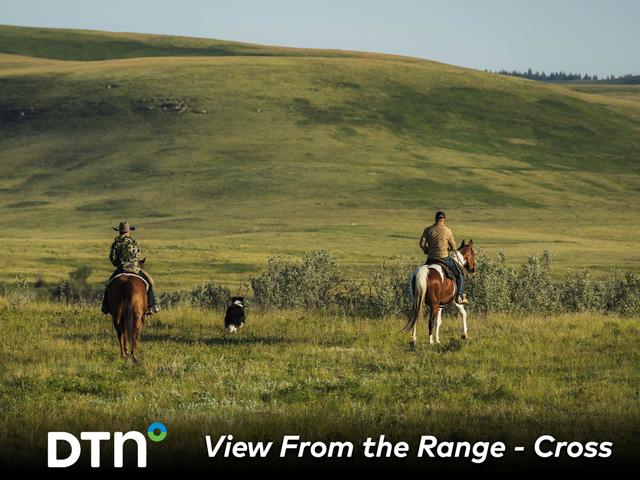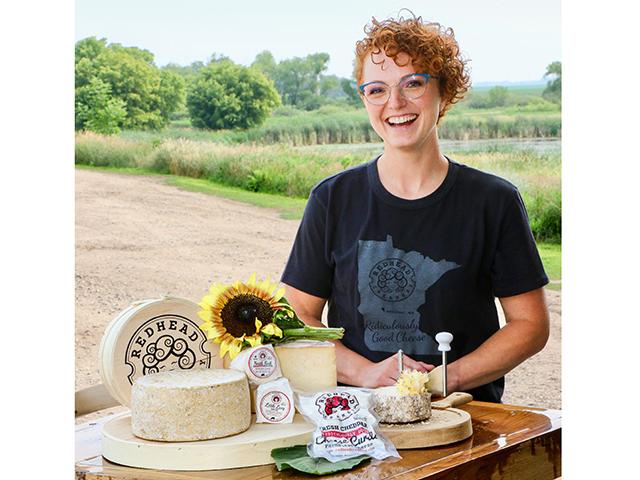Cows, Cheese and a Redhead
Redhead Ready Cheese
A pivotal moment for Redhead Creamery arrived the third week of March 2020, when a sobering message appeared on the computer screen at the family's west-central Minnesota dairy and 5 1/2-year-old artisan cheese-making shop.
You remember March 2020? The COVID-19 pandemic triggered a massive shutdown of businesses and grave uncertainty as to what was ahead.
Every Friday, Redhead's young owners, Alise and Lucas Sjostrom, would receive an order from their wholesaler specifying the quantity of cheese to be delivered by the following Wednesday. Founded in 2014, Redhead Creamery had already received acclaim for cheeses such as Little Lucy Brie, St. Anthony Whiskey Washed and bags of their Ridiculously Good Cheddar Cheese Curds.
The wholesale orders constituted about a third of the company's income. The additional thirds came from visitors/tours to the farm and sales at regional farmers' markets, respectively.
"That day, we received our first order for zero cheese in six years of business," says Lucas, who handles the financial side of Redhead Creamery, allowing wife, Alise, the talented fromager, to focus on making cheese. No farmers' markets or customers at the farm also meant no income from cheese during February and March.
"We still needed to make cheese," Lucas says. "Our bulk tanks were full of milk."
It would be remiss not to mention the other milk-making half of this operation, Jerry and Linda Jennissen, Alise's parents. They have operated Jer-Lindy Farms since 1983 and were enthusiastic supporters of the young couple's move home to make cheese.
WHAT TO DO?
Lucas and Alise moved fast. On their Facebook page and website, they copied a map of their region of Minnesota and drew a circle that encompassed a two-hour radius from the farm in Brooten. The circle included the metro area of Minneapolis-St. Paul. Redhead Creamery promised home delivery of premium, local, award-winning cheeses and cheese curds, and their homemade macaroni and cheese within that two-hour radius.
The announcement was posted Monday, and expectations were low. Anxiety was high. About 11 a.m. the next day, Alise called Lucas from their respective offices at the farm.
"You need to shut it off," Alise told her husband.
P[L1] D[0x0] M[300x250] OOP[F] ADUNIT[] T[]
"Shut what off?" Lucas replied.
"You need to shut off the ordering system because we can't get it all filled," she told him.
Turns out Alise checked their website, and Redhead Creamery had already received 70 orders from the Twin Cities area in less than 24 hours. Prior to this, they would receive maybe three online orders per week.
The couple kicked into business survival mode. By 3 p.m. the same day, they had loaded coolers full of just-made cheese curds and freshly aged cheese, and pans of their homemade macaroni and cheese into the back of the pickup and left for Minneapolis-St. Paul. Armed with a list of customer orders and addresses -- and their GPS -- they made the deliveries.
Nine hours later, at 1 a.m., Alise and Lucas pulled back into the drive at the Brooten farm, tired but thrilled.
"People were excited when we arrived, a few jumping up and down on their doorstep," Lucas says. "The best feeling is watching someone consume your product and enjoy it. When you farm dairy, corn and soybeans, you don't get much chance to see that directly."
Not surprisingly, the deliveries have remained a feature of the business. One day a week, they deliver to the Twin Cities and the next week, to the Fargo region.
EARLY INTEREST IN CHEESE
Alise had declared at age 17 she wanted to make cheese. She even devised her own curriculum at the University of Minnesota. She worked for a food broker and a cheese company during college, and learned cheese-making at a noted artisan cheese plant in Vermont for a couple of years after. Also in Vermont, Lucas got his first job working for the Holstein Association USA.
"We were really excited when Alise and Lucas talked about coming home to make cheese," says her mother, Linda. "We were happy to help do that, but we didn't know anything about making cheese," she says.
Her father, Jerry, was likewise pleased with the idea the two would come home. "I don't think we ever sat down and said we want the kids to come home or not come home," he says. "In the back of your mind, though, you hope the business you built doesn't stop."
The Jennissens, who themselves met as children showing 4-H dairy calves, had for years discussed some type of agritourism. Alise and Lucas returning home made that possible, even necessary. Additional sources of income on a 200-head dairy were going to be needed to support another family.
GETTING STARTED
Thus began the process of obtaining financing and permits, and building Redhead Creamery, which uses Alise's signature curly tresses. Alise continued to hone her craft, seeking to make a variety of cheeses she liked while also making what people want to purchase.
An online Kickstarter campaign raised $42,000 in donations. Another linchpin of their early efforts came from the Minnesota Dept. of Agriculture's AGRI Value-Added Grant Program, which can kick in as much as 25% of eligible expenses for new ventures.
All along, Lucas continued to work full time. He now serves as the managing director at Edge Dairy Farmer Cooperative and also works for Minnesota Milk Producers Association.
In the fall of 2014, as the family neared the creamery's projected opening, there were equipment issues that prevented them from making cheese. In the meantime, their business Facebook page was already up, and Redhead Creamery had also been included on a list of made-in-Minnesota products.
As they raced to repair and replace equipment so they could fully begin cheese production, calls came in from two separate companies that wanted to bring buses to the farm for a tour and to buy cheese.
"You can't pass up a bus with 60 people," Lucas says. Redhead Creamery had limited quantities of cheese available, so they bought cheeses from other companies to be able to offer more for purchase. "We had our first events when we weren't even open to the public yet," he says.
A NEW VENTURE
Redhead Creamery is about to enter a new phase of the business in addition to cheese, cheese shop, farm tours and milk production. Construction is underway on a distillery on the farm -- but not just any distillery. The new venture -- Redhead Creamery Spirits -- will use the cheese-making byproduct, milk whey, as the basis for an ancient, distilled spirit known as araga. Originating in Mongolia and eastern Russia, this "milk vodka" is a flavorful clear drink. The plan is to sell araga exclusively at the distillery, which is to open before the end of 2023.
As Alise and Lucas juggle their work and home lives (they have three children: Lucy, 11, Henry, 7, and Conan, 3), both say they've learned a lot but aren't sure what they would've or could've done differently.
"On the one hand, it would have been nice to have more capital," Lucas says, "but on the other hand, that can slow a lot of learning." Their education remains a work in progress.
[PF_1123]
(c) Copyright 2023 DTN, LLC. All rights reserved.




